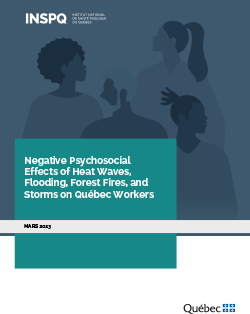Negative Psychosocial Effects of Heat Waves, Flooding, Forest Fires, and Storms on Québec Workers
In the implementation of Québec’s 2013-2020 Climate Change Action Plan, the ministère de la Santé et des Services sociaux mandated the Institut national de santé publique du Québec with conducting an exploratory study on the psychosocial effects experienced by workers as the result of four extreme weather events, the frequency of which will be exacerbated by climate change: heat waves, flooding, storms, and forest fires.
It aims to briefly examine the literature and knowledge of various key actors in order to propose more significant next steps for research projects that respond to Québec’s workplace and public health needs and issues.
This study has shown:
- The extreme weather events studied can have psychosocial effects on workers, but the knowledge of these effects varies greatly by event.
- The psychosocial effects on workers have been the most thoroughly documented in the scientific literature for storms, less well documented for floods and forest fires, and little documented for heat waves.
- Frontline workers (such as municipal employees, police officers, firefighters, health professionals who provide services to emergency victims, public works employees, etc.) and farmers are among the most studied groups of workers.
- Negative psychological effects like burnout, fatigue, psychological distress, anxiety, anger, and sadness were reported more often in the literature than social impacts.
- There are organizational risk factors (e.g., overwork; lack of training, material resources or available staff) and personal risk factors (e.g., being a disaster victim oneself, lack of contact with family members) common to several events and types of workers that can exacerbate the psychosocial effects workers experience. There are also protective factors (e.g., appreciation or gratitude, individual resilience, social support, and collective efficacy).
- It is important to consult key actors to improve the knowledge from the scientific literature. Consultations with key actors conducted as part of this study made it possible to identify new vulnerable workers, learn more about the characteristics of some extreme weather events, and learn that the psychosocial effects following these events can be positive.
- Acquiring knowledge on the psychosocial effects experienced by workers following a flood responds to the workplace and public health needs and issues in Québec.


